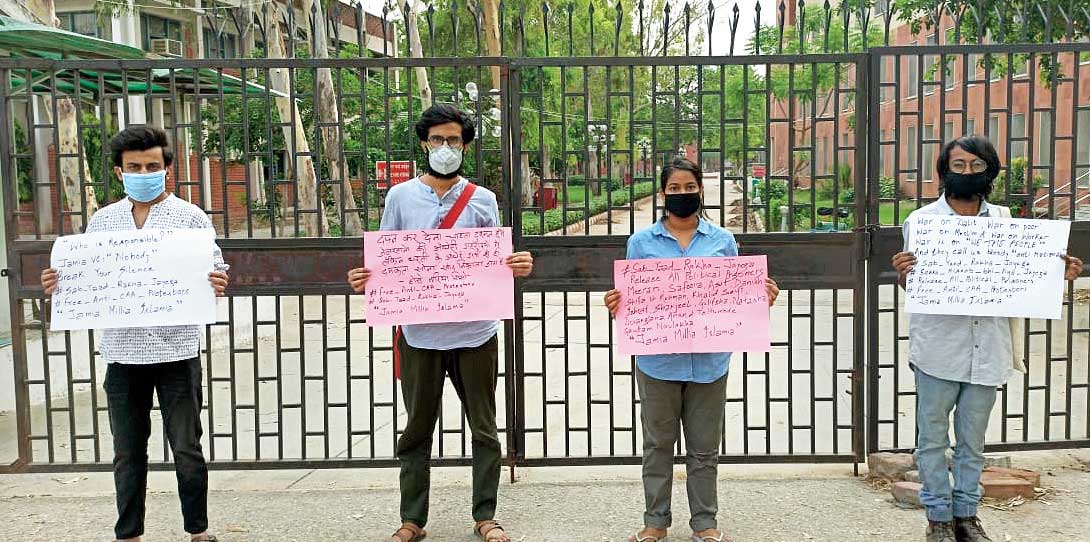Delhi on Wednesday witnessed the first scenes of public protests by students, who wore masks and maintained social distancing, since the lockdown began on March 25.
Small groups of poster-carrying students stood on pavements near Delhi University, opposite Jamia Millia Islamia and JNU, demanding repeal of the new citizenship matrix and anti-terror law UAPA and the release of all political prisoners.
The protest, carried out online and on the ground, was named “Sab Yaad Rakha Jaayega (Everything will be remembered)” after a poem by Aamir Aziz.
“People will remember the government’s oppression and they will also remember those who protested,” the DU unit secretary of CPIML Liberation’s All India Students Association (AISA) told The Telegraph.
Five students were detained near JNU and five more near DU. They were later released. A journalist was detained and released near JNU.
Several students are facing terror charges for protesting against the new citizenship matrix, and have been accused by police of inciting the February communal riots that killed 53 people in northeast Delhi.
The police filed two more chargesheets on the riot cases on Wednesday. One of them was on the murder of Intelligence Bureau security assistant Ankit Sharma, in which the police have accused the suspended Aam Aadmi Party municipal councillor, Tahir Hussain.
The other chargesheet, relating to arson at a school, accuses the owner of a neighbouring school, Faisal Farooque, and several others.
A crime branch media statement said: “His (Farooque’s) call detail analysis and links with prominent members of the Popular Front of India, Pinjratod group, Jamia Coordination Committee, Hazrat Nizamuddin Markaz and some other fundamental Muslim clerics including Deoband also show the depth of the conspiracy.
“In fact, it has been found that Faisal Farooque had visited Deoband just one day before the riots started, i.e. on 23.2.2020. Evidence of conspiracy is further brought out by the fact that on the day of riots, i.e. 24.2.2020, many children from Muslim families left the school early, along with their parents, during the half-time recess itself.”
Several members of the women’s student group Pinjra Tod and the Jamia Coordination Committee are currently behind bars.
Despite prodding from Delhi High Court and the Opposition’s demands, BJP politicians accused of making incendiary speeches before and during the riots have not been booked.
While the police were deployed in the heart of DU and outside Jamia and JNU to prevent protests, students in groups of five protested in neighbouring areas and uploaded videos online on Wednesday.
“The police sent us a notice not to protest at Gate 4, and we replied that we were not protesting there, but the police’s victimising of dissenters while letting instigators of the communal pogrom go free compels us to raise our voice,” the AISA leader said.
“We have done so maintaining social distance and wearing masks in small groups as we respect the life and liberty of people. On the other hand, the police are doing the opposite of the Supreme Court’s directive to decongest prisons by picking up students from their homes on false pretexts.”
In the evening, people tweeted with the hashtag #SabYaadRakhaJaayega although many pro-establishment handles used the same hashtag to warn people against protests in India and the US.
Pinjra Tod hosted music and poetry readings on its Facebook page. Activists in the US, UK, Spain and Greece uploaded images of themselves holding posters to demand the release of political prisoners in India.











